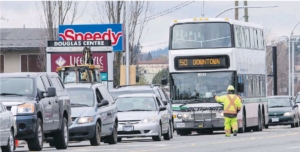The folly of Victoria’s war on the car

Traffic backs up on Douglas Street. Steve Wallace argues the City of Victoria is engaged in an active war on the automobile.
Once upon a time in a land close by, there was a war on the car. This seemingly co-ordinated plot involved a stalemate of the traffic-light system on a provincial highway: From the government seat of power all the way to a neighboring municipality, every traffic light was timed to stop vehicular traffic by turning solid red at the most inappropriate time.
This idiotic move had many vehicles unnecessarily idling, causing an unwanted emissions assault upon our precious environment. It is a relatively simple task to time traffic lights to the advantage of the travelling public, as well as the environment. If the goal, as some vehicle occupants believe to be true, is to frustrate and confound daily commuters, it is certainly working. Every other city in a land far away can synchronize traffic lights. Why not a land close by?
This land close by has done a relatively good job of bike-lane construction. Would it not have been logical to plan for the implementation of the bike-lane-delay timing by modifying the cycle of the traffic lights before construction of same? Is it the intention of the land close by to frustrate and alienate the driving public? Hurry up and wait is the order of the day.
Perhaps the driving public should be advised to pull over and chill for a bit in the land close by. But that brings challenges of its own. The elimination of parking spaces in well-travelled areas is a staple of this land close by.
The land close by seems to do a patchwork-quilt paving of streets and roads. Drivers can count several dozen patches per block of city highways and byways. This land was once known as the pothole terminator. Not so these days. It seems like the only way to avoid the pothole preponderance is to ride in a bike lane. The plot thickens.
The plot to get cars off the road is furthered by handing out free bus passes to youth. This is a good idea. Parents will be less likely to give their kids a ride when the bus option is so easy.
Bus drivers are very safe, and these knights of the road can be trusted to transport increasing numbers of young riders in a safe and efficient manner. Yet in giving youth free bus passes,
a land close by has alienated the very seniors who have paid for this transport system over several decades.
Seniors should at least be given the same privilege. Their presence would be a catalyst for good behaviour. Now, if only some of the city’s road lanes were wide enough to accommodate a transit bus.
This war on the car seems to be in stark contrast to the freedom to move philosophy of a bygone provincial government in a land close by.
A quick check of the Local Government Act (formerly the Municipal Act) shows a demand for the provision of only one service. It is not sewer, water, fire, roads, recreation, zoning and the like.
It is policing. Starving the police of the necessary funds to adequately do regular tasks such as traffic enforcement, when higher-priority duties call, is another way of confounding the orderly
movement of vehicular traffic in a land close by.
Where is this land close by? It is at the bottom end of an island in the Pacific. It is a popular port of call for cruise ships. A wonderful place, were it not for the war on cars. Steve Wallace
is the owner of Joan Wallace Driving School on Vancouver Island. He is a former vice president of the Driving Schools Association of the Americas, a registered B.C. teacher and a University of Manitoba graduate.


